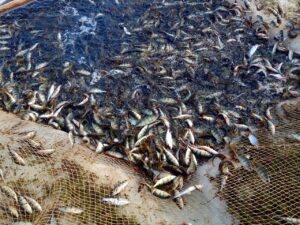There has been a flurry of activity by governments, environmentalists, and industry working on climate issues to prepare for the annual international Conference of the Parties (COP). Now in its 28th year, one question looms — will COP28 finally deliver meaningful progress toward the climate crisis?
Eight years since the adoption of the Paris Agreement, which binds nations to take steps to curb greenhouse gas emissions, these targets remain woefully off-track. Global greenhouse gas emissions reached new highs in 2022, and recent UN-commissioned research suggests that 2030 may witness a peak in global fossil fuel use, far from half the emissions envisioned by 2030.
Leaders have had ample opportunities to translate their promises into action yet remain gridlocked on abating fossil fuel production. At COP28 global leaders can bring about significant change on multiple key fronts and answer the growing demands of small island developing states (SIDS), which face the greatest threat from climate change, despite being the least responsible for causing the problem.
These island states account for only 1 percent of total greenhouse gas emissions. However, climate change has shown little mercy towards these countries. Research shows that melting of the West Antarctic Ice Sheet is now unavoidable, potentially raising sea levels as much as 5.3 meters,( more than 17 feet) and posing an existential threat to countries that sit near sea level.
The island nation of Tuvalu, for example, lies 15 feet above sea level and faces a wide range of cascading climate threats. Flooding undermines local infrastructure such as access to freshwater, sewage treatment, energy distribution, and housing. Saltwater inundation has transformed once-thriving trees into “ghost forests.” Sea level rise, “sunny day” flooding, and storms disrupt ordinary life, keeping children from school and limiting access to healthcare. The people of Tuvalu witness first-hand how climate change erodes sustainable development progress and jeopardizes the most basic daily functions. And sadly, the Tuvalu story can be told countless times across island states.
Despite an outsized role in creating this climate crisis, the developed world has remained notably silent. From the 2009 commitment to mobilize $100 billion in annual climate finance to repeated pledges to the Adaptation Fund that go unrealized, broken promises have piled up. Last month, the Green Climate Fund’s (GCF) second replenishment fell short of the precedent set in 2019. This year, the GCF raised $9.3 billion, $700 million less than 2019. SIDS have received paltry consolation – an average of 2.1 billion in resilience finance per year between 2018 and 2020, as compared to the $160-340 billion in adaptation costs that the UN estimates by 2030. To date, SIDS have been the recipients of only three percent of public climate funding, and only one percent of private finance. The alarm bell for adaptation investment is ringing and will continue into the future.
What can be done to close the gap?
First, COP28 must finally deliver on the 2009 commitment to mobilize the climate adaptation funds required to support small island developing states. To do this, donor governments, multilateral development banks (MDBs), and other funders must make more resources available. This will require increasing total lending levels – including, tripling lending levels of MDBs by 2030.
About two-thirds of the funding for SIDS has been in grants, some consider this good news, as it spares nations from higher debt. Yet grant funds can be limited in scope and timeframe adding uncertainty to projects over time. Despite the high level of climate risk that SIDS faces, they often have income levels that preclude them from other types of funding, including concessional loans. These countries are one storm away from sinking deeper into debt. Eligibility criteria for concessional funding should be expanded beyond GDP per capita, as referenced in the Bridgetown Agenda 2.0.
Second, global leaders must take steps to mobilize private adaptation finance. These nations need greater assistance with adaptation efforts—including improved early warning systems, restoration for coral reefs and other ecosystems, and improved wastewater drainage systems. While these types of investments can be very effective in reducing climate risk, they may not generate predictable cash flows which can dampen the deal for private capital.
To meet this challenge, “dual benefit” solutions like renewable energy investments to build resilience are particularly important. The Bridgetown Agenda 2.0 proposes measures for private finance mobilization, including expanded project support, risk reduction, and blended finance to strengthen the pipeline of bankable projects. Unlocking funds for green and blue bonds can also hold promise and mobilize a larger ecosystem of private capital for climate adaptation. Establishing predictable policies and regulatory schemes that enable the green and blue transition will help governments and international financial institutions and offer guidance for potential investors.
Third, prioritizing debt sustainability – through either debt forgiveness or easier debt management – will help small island developing states devote more of their own resources to climate adaptation. The Bridgetown Agenda 2.0 recommends debt relief, restructuring debt burdens, and adding natural disaster clauses to loans. 13 of the 39 SIDS nations have high levels of debt distress, spending 18 times more in debt repayments than they receive in climate finance. Creative solutions like debt-for-nature swaps, which offer the opportunity to build climate resilience while reducing debt burdens, have been adopted by Seychelles and Belize.
SIDS face a concerning distinction as the climate ‘one percent’ – only one percent responsible, yet only one percent equipped by private finance to weather these impacts.
More expansive and inclusive climate finance provides an opportunity for those accountable to assist others grappling with the consequences, fostering a more equitable and collaborative global response to climate challenges. The price of climate change – in lives lost, livelihoods and infrastructure destroyed, and the crushing burdens of higher levels of debt – is too high today. The cost will only grow in the coming decades as climate change impacts evolve and escalate. Inaction at COP28 risks alienating SIDS and other developing countries who need strong partners on the frontlines of the climate crisis.
Sally Yozell is a Senior Fellow and the Director of Environmental Security at the Stimson Cetner a Washington DC based research institution
Alice Hill is the David M. Rubenstein Senior Fellow for Energy and the Environment at the Council on Foreign Relations in Washington DC .




